九年级英语1-5单元知识点 2
- 格式:doc
- 大小:68.50 KB
- 文档页数:6
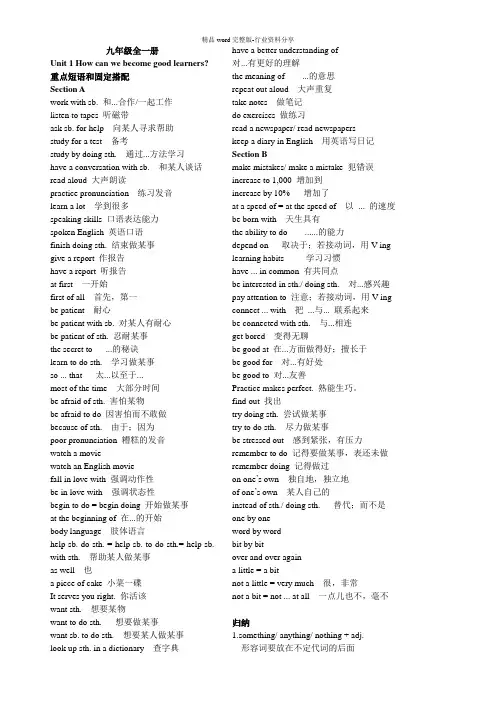
九年级全一册Unit 1 How can we become good learners? 重点短语和固定搭配Section Awork with sb. 和...合作/一起工作listen to tapes 听磁带ask sb. for help 向某人寻求帮助study for a test 备考study by doing sth. 通过...方法学习have a conversation with sb. 和某人谈话read aloud 大声朗读practice pronunciation 练习发音learn a lot 学到很多speaking skills 口语表达能力spoken English 英语口语finish doing sth. 结束做某事give a report 作报告have a report 听报告at first 一开始first of all 首先,第一be patient 耐心be patient with sb. 对某人有耐心be patient of sth. 忍耐某事the secret to ...的秘诀learn to do sth. 学习做某事so ... that 太...以至于...most of the time 大部分时间be afraid of sth. 害怕某物be afraid to do 因害怕而不敢做because of sth. 由于;因为poor pronunciation 糟糕的发音watch a moviewatch an English moviefall in love with 强调动作性be in love with 强调状态性begin to do = begin doing 开始做某事at the beginning of 在...的开始body language 肢体语言help sb. do sth. = help sb. to do sth.= help sb. with sth. 帮助某人做某事as well 也a piece of cake 小菜一碟It serves you right. 你活该want sth. 想要某物want to do sth. 想要做某事want sb. to do sth. 想要某人做某事look up sth. in a dictionary 查字典have a better understanding of对...有更好的理解the meaning of ...的意思repeat out aloud 大声重复take notes 做笔记do exercises 做练习read a newspaper/ read newspaperskeep a diary in English 用英语写日记Section Bmake mistakes/ make a mistake 犯错误increase to 1,000 增加到increase by 10% 增加了at a speed of = at the speed of 以... 的速度be born with 天生具有the ability to do ......的能力depend on 取决于;若接动词,用V-ing learning habits 学习习惯have ... in common 有共同点be interested in sth./ doing sth. 对...感兴趣pay attention to 注意;若接动词,用V-ing connect ... with 把...与... 联系起来be connected with sth. 与...相连get bored 变得无聊be good at 在...方面做得好;擅长于be good for 对...有好处be good to 对...友善Practice makes perfect. 熟能生巧。
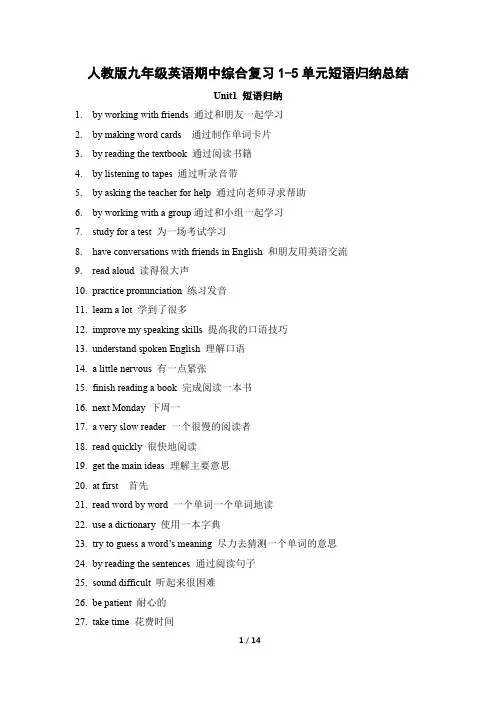
人教版九年级英语期中综合复习1-5单元短语归纳总结Unit1 短语归纳1.by working with friends 通过和朋友一起学习2.by making word cards 通过制作单词卡片3.by reading the textbook 通过阅读书籍4.by listening to tapes 通过听录音带5.by asking the teacher for help 通过向老师寻求帮助6.by working with a group通过和小组一起学习7.study for a test 为一场考试学习8.have conversations with friends in English 和朋友用英语交流9.read aloud 读得很大声10.practice pronunciation 练习发音11.learn a lot 学到了很多12.improve my speaking skills 提高我的口语技巧13.understand spoken English 理解口语14.a little nervous 有一点紧张15.finish reading a book 完成阅读一本书16.next Monday 下周一17.a very slow reader 一个很慢的阅读者18.read quickly 很快地阅读19.get the main ideas 理解主要意思20.at first 首先21.read word by word 一个单词一个单词地读e a dictionary 使用一本字典23.try to guess a word’s meaning 尽力去猜测一个单词的意思24.by reading the sentences 通过阅读句子25.sound difficult 听起来很困难26.be patient 耐心的27.take time 花费时间28.the more…, the faster… 越多……,越快……29.the secret to language learning 语言学习的秘密30.a bad dream 噩梦31.speak so quickly 讲得很快32.be afraid to ask questions 很害怕去问问题33.because of 因为34.the poor pronunciation 差的发音35.hide behind my textbook 躲在我的课本后面36.never say anything 绝不说任何事37.fall in love with 爱上38.this exciting and funny movies 这些精彩有趣的电影39.their body language and the expressions on their faces 他们的身体语言和脸上的表情40.help me to get the meaning 帮助我理解意思41.listen to something interesting 听一些有趣的东西42.learn useful sentences 学习有用的句子43.I t’s a piece of cake. 小菜一碟。
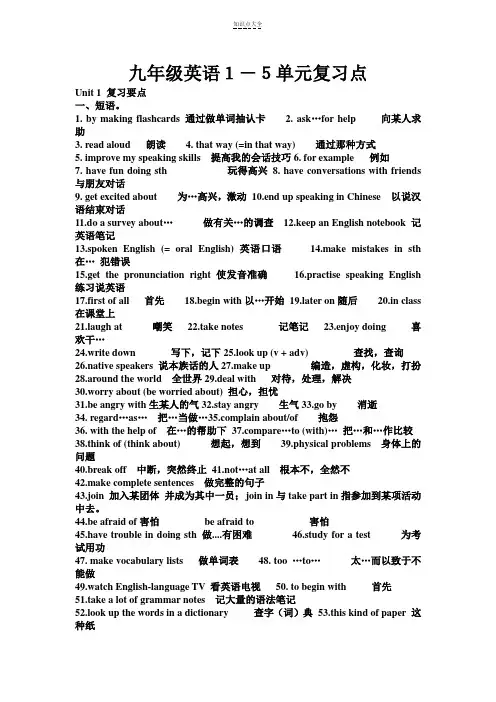
九年级英语1-5单元复习点Unit 1 复习要点一、短语。
1. by making flashcards 通过做单词抽认卡2. ask…for help 向某人求助3. read aloud 朗读4. that way (=in that way) 通过那种方式5. improve my speaking skills 提高我的会话技巧6. for example 例如7. have fun doing sth 玩得高兴8. have conversations with friends 与朋友对话9. get excited about 为…高兴,激动10.end up speaking in Chinese 以说汉语结束对话11.do a survey about…做有关…的调查12.keep an English notebook 记英语笔记13.spoken English (= oral English) 英语口语14.make mistakes in sth 在…犯错误15.get the pronunciation right 使发音准确16.practise speaking English 练习说英语17.first of all 首先18.begin with以…开始ter on随后20.in class 在课堂上ugh at 嘲笑22.take notes 记笔记23.enjoy doing 喜欢干…24.write down 写下,记下25.look up (v + adv) 查找,查询26.native speakers 说本族话的人27.make up 编造,虚构,化妆,打扮28.around the world 全世界29.deal with 对待,处理,解决30.worry about (be worried about) 担心,担忧31.be angry with生某人的气32.stay angry 生气33.go by 消逝34. regard…as…把…当做…plain about/of 抱怨36. with the help of 在…的帮助下pare…to (with)…把…和…作比较38.think of (think about) 想起,想到39.physical problems 身体上的问题40.break off 中断,突然终止41.not…at all 根本不,全然不42.make complete sentences 做完整的句子43.join 加入某团体并成为其中一员;join in与take part in指参加到某项活动中去。
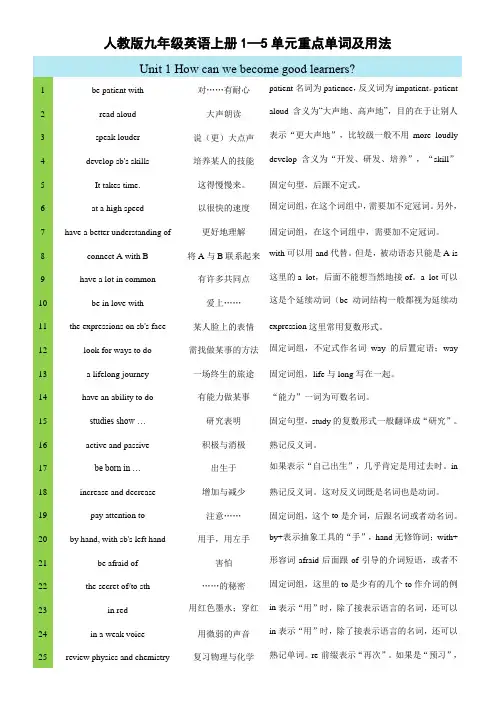
人教版九年级英语上册1—5单元重点单词及用法Unit 1 How can we become good learners?1 be patient with 对……有耐心patient名词为patience,反义词为impatient。
patient2 read aloud 大声朗读aloud含义为“大声地、高声地”,目的在于让别人3 speak louder 说(更)大点声表示“更大声地”,比较级一般不用more loudly4 develop sb's skills 培养某人的技能develop含义为“开发、研发、培养”,“skill”5 It takes time. 这得慢慢来。
固定句型,后跟不定式。
6 at a high speed 以很快的速度固定词组,在这个词组中,需要加不定冠词。
另外,7 have a better understanding of 更好地理解固定词组,在这个词组中,需要加不定冠词。
8 connect A with B 将A与B联系起来with可以用and代替。
但是,被动语态只能是A isconnected with B9 have a lot in common 有许多共同点这里的a lot,后面不能想当然地接of。
a lot可以something nothing10 be in love with 爱上……这是个延续动词(be动词结构一般都视为延续动fall in love with11 the expressions on sb's face 某人脸上的表情expression这里常用复数形式。
12 look for ways to do 需找做某事的方法固定词组,不定式作名词way的后置定语;way13 a lifelong journey 一场终生的旅途固定词组,life与long写在一起。
14 have an ability to do 有能力做某事“能力”一词为可数名词。
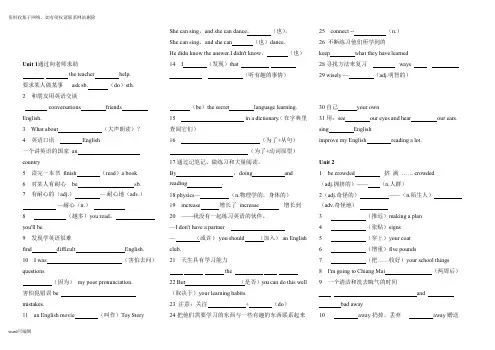
Unit 1通过向老师求助the teacher help. 要求某人做某事ask sb. (do)sth. 2和朋友用英语交谈She can sing,and she can dance,(也),She can sing,and she can (也)dance.He didn know the answer.I didn't know,(也)14 I (发现)that(听有趣的事情)25connect -- (n.)26不断练习他们所学到的keep what they have learned28寻找方法来复习ways29wisely —(adj.明智的)conversations friends (be)the secret language learning. 30 自己your ownEnglish.3 What about (大声朗读)?15 in a dictionary(.查阅它们)在字典里31 用:see our eyes and hear our ears.sing English4 英语口语English 16 (为了+从句)improve my English reading a lot. 一个讲英语的国家an (为了+动词原型)country5读完一本书finish (read)a book6对某人有耐心be sb.7有耐心的(adj.)—耐心地(adv.)—耐心(n.)8(越多)you read,you'll be.9发现学英语很难find difficult English.10I was (害怕去问)questions(因为)my poor pronunciation. 17通过记笔记、做练习和大量阅读。
By ,doing andreading .18physics—(n.物理学的,身体的)19increase 增长了increase 增长到20——我没有一起练习英语的伙伴。
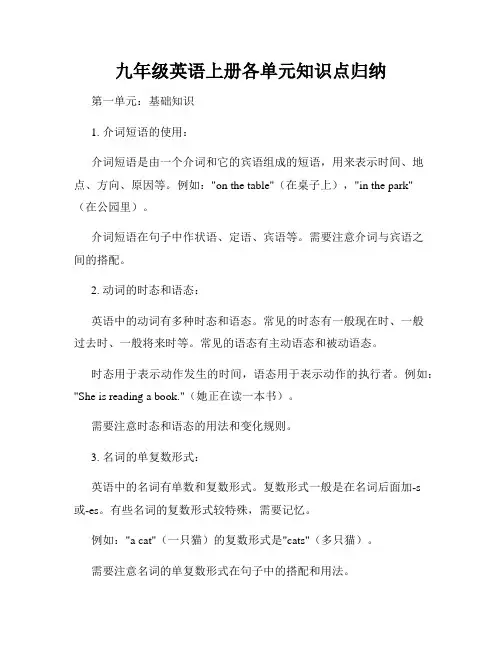
九年级英语上册各单元知识点归纳第一单元:基础知识1. 介词短语的使用:介词短语是由一个介词和它的宾语组成的短语,用来表示时间、地点、方向、原因等。
例如:"on the table"(在桌子上),"in the park"(在公园里)。
介词短语在句子中作状语、定语、宾语等。
需要注意介词与宾语之间的搭配。
2. 动词的时态和语态:英语中的动词有多种时态和语态。
常见的时态有一般现在时、一般过去时、一般将来时等。
常见的语态有主动语态和被动语态。
时态用于表示动作发生的时间,语态用于表示动作的执行者。
例如:"She is reading a book."(她正在读一本书)。
需要注意时态和语态的用法和变化规则。
3. 名词的单复数形式:英语中的名词有单数和复数形式。
复数形式一般是在名词后面加-s或-es。
有些名词的复数形式较特殊,需要记忆。
例如:"a cat"(一只猫)的复数形式是"cats"(多只猫)。
需要注意名词的单复数形式在句子中的搭配和用法。
第二单元:阅读理解1. 完型填空:完型填空是一种考察学生对语境理解和词汇运用能力的题型。
在完型填空中,通常给出一篇文章和一些空格,要求学生根据文章内容和语境选择正确的单词或短语填入空格中。
通常需要结合文章整体逻辑和上下文意义来填写正确答案。
2. 阅读理解题:阅读理解题是一种考察学生阅读理解能力和推理能力的题型。
通常会给出一篇短文或文章,然后根据文章内容提出一些问题,要求学生根据文章内容和推理来回答问题。
需要学会熟练阅读和理解文章,抓住关键信息和主题,并能运用推理等能力来回答问题。
第三单元:语法知识1. 直接引语和间接引语:在英语中,当我们引述别人的话时,可以使用直接引语和间接引语。
直接引语是直接引用别人所说的话,使用引号将其包围;间接引语是将别人所说的话转述出来。
例如:直接引语:"I am happy," she said.(她说:“我很开心。
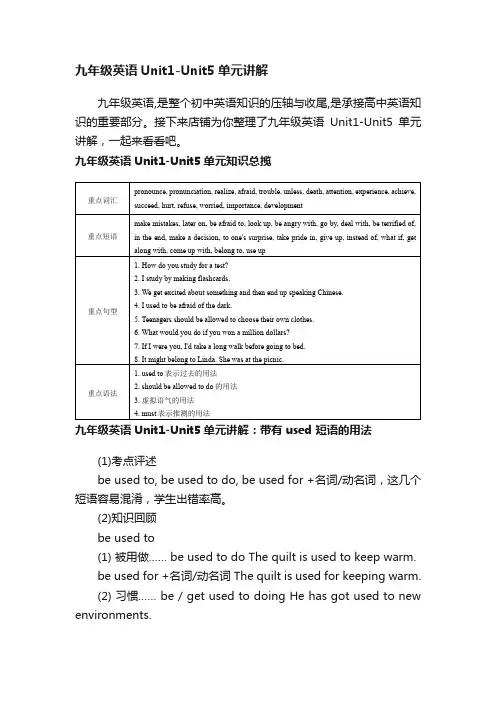
九年级英语Unit1-Unit5单元讲解九年级英语,是整个初中英语知识的压轴与收尾,是承接高中英语知识的重要部分。
接下来店铺为你整理了九年级英语Unit1-Unit5单元讲解,一起来看看吧。
九年级英语Unit1-Unit5单元知识总揽(1)考点评述be used to, be used to do, be used for +名词/动名词,这几个短语容易混淆,学生出错率高。
(2)知识回顾be used to(1) 被用做…… be used to do The quilt is used to keep warm.be used for +名词/动名词 The quilt is used for keeping warm.(2) 习惯…… be / get used to doing He has got used to new environments.(3) 过去常做 used to do (did something very often in the past)He used to go there. But now, he seldom go there.(3)考题赏析例1 (2008·黑龙江哈尔滨)While traveling to Canada, you should give yourself a day to the time and know the way nearby.A. used toB. be used toC. use to解析:本题主要考查了be used to的用法:习惯什么事情。
答案:B.点评:对于此类问题的解决需要学生易混点进行准确的记忆。
九年级英语Unit1-Unit5单元讲解:带有否定词的反义疑问句(1)考点评述反义疑问句,即附加疑问句。
它表示提问人的看法没有把握,需要对方证实。
反义疑问句由两部分组成:前一部分是一个陈述句,后一部分是一个简短的疑问句,两部分的人称时态应保持一致。
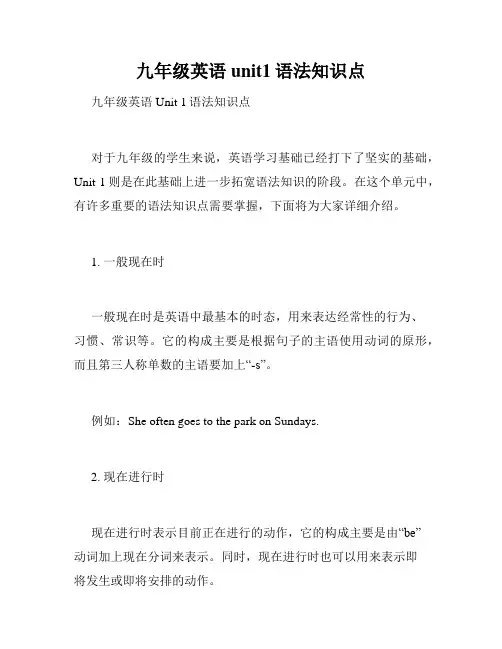
九年级英语unit1语法知识点九年级英语Unit 1语法知识点对于九年级的学生来说,英语学习基础已经打下了坚实的基础,Unit 1则是在此基础上进一步拓宽语法知识的阶段。
在这个单元中,有许多重要的语法知识点需要掌握,下面将为大家详细介绍。
1. 一般现在时一般现在时是英语中最基本的时态,用来表达经常性的行为、习惯、常识等。
它的构成主要是根据句子的主语使用动词的原形,而且第三人称单数的主语要加上“-s”。
例如:She often goes to the park on Sundays.2. 现在进行时现在进行时表示目前正在进行的动作,它的构成主要是由“be”动词加上现在分词来表示。
同时,现在进行时也可以用来表示即将发生或即将安排的动作。
例如:He is studying English in the library.3. 一般过去时一般过去时用来表示过去发生的动作或存在的状态。
它的构成主要是根据句子的主语使用动词的过去式,同时肯定句中要使用助动词“did”。
例如:They visited their grandparents last weekend.4. 过去进行时过去进行时表示在过去某个时间段正在进行的动作。
它的构成主要是由“was/were”动词加上现在分词来表示。
例如:I was watching TV when he called me.5. 一般将来时一般将来时主要用来表达将来的动作或事情。
它的构成主要是由“will/shall”加上动词原形来表示。
例如:We will have a picnic next Sunday.6. 情态动词情态动词可以用来表达能力、可能性、推测以及许可等。
常见的情态动词有can、may、must、shall、will等。
值得注意的是,情态动词后面的动词使用原形。
例如:You must finish your homework.7. 句型及从句九年级的学生还需要学习掌握一些常见的句型和从句的用法。
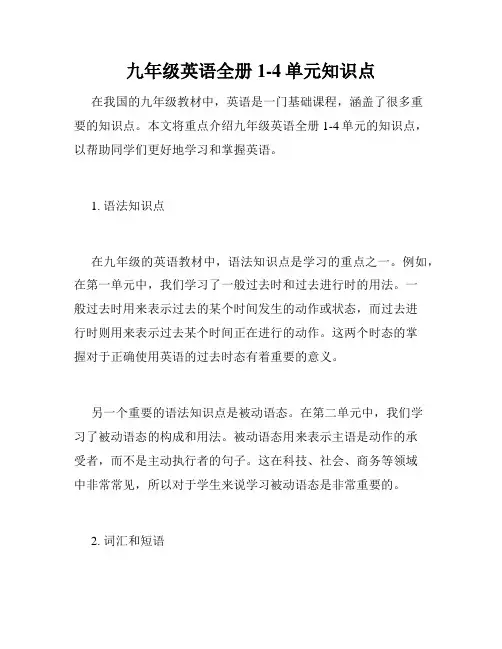
九年级英语全册1-4单元知识点在我国的九年级教材中,英语是一门基础课程,涵盖了很多重要的知识点。
本文将重点介绍九年级英语全册1-4单元的知识点,以帮助同学们更好地学习和掌握英语。
1. 语法知识点在九年级的英语教材中,语法知识点是学习的重点之一。
例如,在第一单元中,我们学习了一般过去时和过去进行时的用法。
一般过去时用来表示过去的某个时间发生的动作或状态,而过去进行时则用来表示过去某个时间正在进行的动作。
这两个时态的掌握对于正确使用英语的过去时态有着重要的意义。
另一个重要的语法知识点是被动语态。
在第二单元中,我们学习了被动语态的构成和用法。
被动语态用来表示主语是动作的承受者,而不是主动执行者的句子。
这在科技、社会、商务等领域中非常常见,所以对于学生来说学习被动语态是非常重要的。
2. 词汇和短语词汇和短语是学习英语的基础。
在九年级的教材中,我们学习了许多新的词汇和短语。
例如,在第三单元中,我们学习了关于购物的表达方式,如商场、付款、打折等。
这些词汇和短语对于同学们在日常生活中购物和交流非常有帮助。
此外,在第四单元中,我们学习了描述人和物品的形容词。
了解这些形容词的用法有助于我们更好地描述人和事物,并提高我们的写作水平。
3. 阅读理解阅读理解是提高英语水平的关键。
在九年级的英语教材中,我们不仅学习了一些有趣的短文和文章,还进行了相关的阅读理解练习。
通过这些阅读练习,我们能够训练自己的阅读能力,提高理解英语文章的能力,并且扩大我们的词汇量。
在理解阅读材料的同时,我们也要学会提取信息和归纳总结。
这些技巧对于解决实际问题和写作都非常重要。
4. 口语交流英语作为全球通用的语言,口语交流能力对于我们的英语学习非常重要。
在九年级的教材中,我们学习了一些口语交流的技巧和实践。
通过模拟对话和角色扮演等活动,我们能够提高自己的口语表达能力,扩展词汇量,提高听力理解能力,并在日常生活中更自如地与外国人交流。
除了在课堂中的练习,我们还可以通过参加英语角、决斗赛等活动来锻炼我们的口语交流能力。
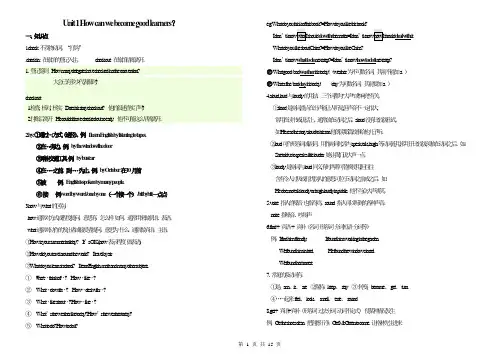
U ni t 1 H o w c an we be c om e g o od l e ar ne rs?一、知识点1.c h e c k不及物动词,“打钩”.c h e c k i n:在旅馆的登记入住。
c h e c k o u t:在旅馆结账离开。
1.登记签到 H o w m a n y d e l e g a t e s h a v e c h e c k e d i n a t t h e c o n v e n t i o n?大会已有多少代表报到?c h e c k o u t1.检查,核对,核实 D o e s h i s s t o r y c h e c k o u t?他的叙述查实了吗?2.付账后离开 H e c o u l d n't h a v e c h e c k e d o u t s o e a r l y.他不可能这么早就离开。
2.b y:①通过….方式(途径)。
例:I l e a r n E n g l i s h b y l i s t e n i n g t o t a p e s.②在….旁边。
例:b y t h e w i n d o w/t h e d o o r③乘坐交通工具例:b y b u s/c a r④在……之前,到……为止。
例:b y O c t o b e r在10月前⑤被例:E n g l i s h i s s p o k e n b y m a n y p e o p l e.⑥接例w o r d b y w o r d/o n e b y o n e(一个接一个) /b i t b y b i t(一点点)3.h o w与w h a t的区别:h o w通常对方式或程度提问,意思有:怎么样如何,通常用来做状语、表语。
w h a t通常对动作的发出者或接受者提问,意思为什么,通常做宾语,主语。
①H o w i s y o u r s u m m e r h o l i d a y? I t’s O K.(h o w表示程度做表语)②H o w d i d y o u t r a v e l a r o u n d t h e w o r l d? I t r a v e l b y a i r.③W h a t d o y o u l e a r n a t s c h o o l? I l e a r n E n g l i s h,m a t h a n d m a n y o t h e r s u b j e c t s.①W h a t…t h i n k o f…? H o w…l i k e…?②W h a t…d o w i t h…? H o w…d e a l w i t h…?③W h a t…l i k e a b o u t…?H o w…l i k e…?④W h a t’s t h e w e a t h e r l i k e t o d a y?H o w’s t h e w e a t h e r t o d a y?⑤W h a t t o d o?H ow t o d o i t?e.g.W h a t d o y o u t h i n k o f t h i s b o o k?=H o w d o y o u l i k e t h i s b o o k?I d o n’t k n o s h o u l d d o w i t h t h e m a t t e r.=I d o n’t k n o s h o u l d d e a l w i t h i t.W h a t d o y o u l i k e a b o u t C h i n a?=H o w d o y o u l i k e C h i n a?I d o n’t k n o w w h a t t o d o n e x t s t e p?=I d o n’t k n o w h o w t o d o i t n e x t s t e p?㊣ W h a t g o o d/b a d w e a t h e r i t i s t o d a y!(w e a t h e r为不可数名词,其前不能加 a)㊣ W h a t a f i n e/b a d d a y i t i s t o d a y!(d a y为可数名词,其前要加 a)4.a l o u d,l o u d与l o u d l y的用法:三个词都与"大声"或"响亮"有关。
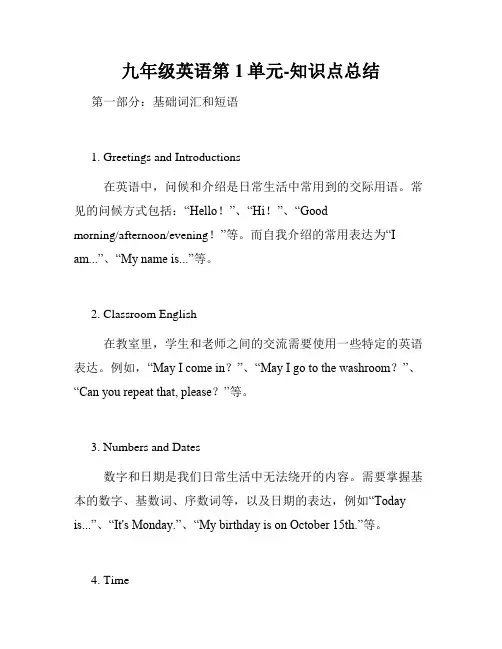
九年级英语第1单元-知识点总结第一部分:基础词汇和短语1. Greetings and Introductions在英语中,问候和介绍是日常生活中常用到的交际用语。
常见的问候方式包括:“Hello!”、“Hi!”、“Goodmorning/afternoon/evening!”等。
而自我介绍的常用表达为“I am...”、“My name is...”等。
2. Classroom English在教室里,学生和老师之间的交流需要使用一些特定的英语表达。
例如,“May I come in?”、“May I go to the washroom?”、“Can you repeat that, please?”等。
3. Numbers and Dates数字和日期是我们日常生活中无法绕开的内容。
需要掌握基本的数字、基数词、序数词等,以及日期的表达,例如“Today is...”、“It's Monday.”、“My birthday is on October 15th.”等。
4. Time谈论时间也是英语学习的重要内容,掌握“in themorning/afternoon/evening”、“at 9 o'clock”、“from...to...”等表达方式非常实用。
5. School Subjects and Facilities学校科目和设施是我们在学校中经常需要提及的。
诸如“Mathematics”、“Science”、“Library”、“Computer lab”等词汇需要熟练掌握。
6. Adjectives and Adverbs形容词和副词是用来描述人、事物和行为的重要词汇。
例如“beautiful”、“kind”、“quickly”、“carefully”等。
第二部分:语法知识点1. Simple Present Tense学习现在时态是英语学习的基础。
在这一时态中,主语和动词的形式要保持一致,例如“I play football.”、“He dances well.”。
九年级上册英语1到5单元知识点总结1. Unit 1: Best friends- Vocabulary: friendship,panion, trust, support- Grammar: present continuous tense, possessive pronouns - Topic: The importance of friendship and how to be a good friend2. Unit 2: English around the world- Vocabulary: bilingual, dialect, accent, globalization- Grammar:parative and superlative adjectives, adverbs of frequency- Topic: The influence of English as a global language and its variations in different countries3. Unit 3: Travel journal- Vocabulary: destination, itinerary, amodation, excursion- Grammar: past simple tense, past continuous tense- Topic: Sharing travel experiences, discussing favorite destinations, and describing past trips4. Unit 4: Great inventions- Vocabulary: innovation, breakthrough, patent, prototype- Grammar: reported speech, passive voice- Topic: Exploring the impact of inventions on society and discussing the process of innovation5. Unit 5: Health and well-being- Vocabulary: nutrition, fitness, well-being, hygiene- Grammar: modal verbs, conditional sentences- Topic: Promoting a healthy lifestyle, discussing the importance of exercise and balanced dietBased on the above knowledge points, it is clear that the ninth-grade English curriculum covers a wide range of topics from interpersonal relationships to globalmunication, from personal experiences to technological advancements, and from physical health to overall well-being. As a language, English not only serves as a means ofmunication but also provides insights into various aspects of life and society.In Unit 1, the focus on friendship highlights the importance of building and maintaining meaningful relationships. The vocabulary related to friendship emphasizes qualities such as trust and support, while the grammar lessons on present continuous tense and possessive pronouns enable students toexpress their thoughts and emotions more accurately. By incorporating these language elements into discussions about friendship, students are able to deepen their understanding of the topic and express themselves more fluently.Moving on to Unit 2, the exploration of English as a global language introduces students to the diversity of language and culture. The vocabulary related to bilingualism and globalization sheds light on the influence of English in different contexts, while the grammar lessons onparative and superlative adjectives provide a framework forparing and contrasting languages. Through discussions on language variations and the impact of globalization, students gain insights into the interconnectedness of the world and the importance of cultural exchange.In Unit 3, the travel journal serves as a platform for students to share their experiences and broaden their perspectives. The vocabulary related to travel and the grammar lessons on past tenses enable students to narrate their past experiences and plan future trips. By engaging in discussions about favorite destinations and travel itineraries, students not only enhance their language skills but also develop a sense of curiosity andadventure.Unit 4 delves into the realm of innovation and invention, offering students a glimpse into the world of creativity and problem-solving. The vocabulary related to innovation and the grammar lessons on reported speech and passive voice provide students with the tools to discuss technological advancements and their impact on society. Through debates on the pros and cons of various inventions, students develop critical thinking skills and an appreciation for human ingenuity.Finally, in Unit 5, the focus on health and well-being encourages students to reflect on their lifestyle choices and habits. The vocabulary related to nutrition and fitness,bined with the grammar lessons on modal verbs and conditional sentences, empowers students to advocate for a healthy lifestyle and express their concerns about public health issues. By engaging in conversations about the importance of exercise and balanced diet, students not only improve their language proficiency but also cultivate a sense of responsibility towards themselves and others.In conclusion, the ninth-grade English curriculum offers a richtapestry of topics that not only enhance language skills but also foster personal growth and broadened perspectives. By incorporating vocabulary, grammar, and topics that are relevant to students' lives, the curriculum provides an engaging and meaningful learning experience.As a writer, I personally find the integration of language learning with real-life topics to be highly effective in stimulating students' interest and fostering a holistic understanding of the English language. Furthermore, the emphasis onmunication skills and critical thinking in the curriculum equips students with the tools to navigate a rapidly changing world, both linguistically and intellectually.In summary, the ninth-grade English curriculum, with its diverse range of topics and language elements, not only prepares students for linguistic proficiency but also nurtures their intellectual curiosity and global awareness. Through the exploration of friendship, globalmunication, travel experiences, technological advancements, and health consciousness, students are not only equipped with language skills but also empowered to navigate theplexities of the modern world. This holistic approach to language learning is essential in nurturingwell-rounded individuals who are capable of engaging with the world in a meaningful and impactful manner.。
九年级英语一到三单元知识点Unit 1 How can we become good learners?一、重点单词。
1. textbook (n.) 教科书;课本。
2. conversation (n.) 交谈;谈话,常用于短语“have a conversation with sb.”(与某人交谈)3. aloud (adv.) 大声地;出声地。
区别于“loud”(adj. 大声的,常用来修饰名词,如a loud voice)和“loudly”(adv. 喧闹地,侧重于嘈杂、喧闹的声音)。
例如:Read aloud to practice pronunciation.(大声朗读来练习发音。
)4. pronunciation (n.) 发音;读音。
例如:His pronunciation is very good.(他的发音很好。
)5. sentence (n.) 句子。
6. patient (adj.) 有耐心的;n. 病人。
常用搭配“be patient with sb.”(对某人有耐心)。
例如:Our teacher is patient with us.(我们的老师对我们很有耐心。
)7. expression (n.) 表达(方式);表示;表情。
例如:Facial expressions can show our feelings.(面部表情能展示我们的情感。
)二、重点短语。
1. make word cards 制作单词卡片。
2. listen to tapes 听磁带。
3. ask the teacher for help 向老师求助。
4. read aloud 大声朗读。
5. have conversations with 与……交谈。
6. give a report 作报告。
7. word by word 逐字地。
8. the secret to... ……的秘诀。
例如:The secret to success is hard work.(成功的秘诀是努力工作。
人教版九年级英语unit1知识点大全人教版九年级英语unit1知识点一. Unit1 单词textbook n.教科书;课本conversation n.交谈;谈话aloud adv.大声地;出声地pronunciation n. 发音;读音sentence n.句子patient adj.有耐心的 n.病人expression n.表达(方式);表示discover v.发现;发觉secret n.秘密;adj. 秘密的fall in love with 爱上;与??相爱grammar n.语法repeat v.重复;重做note n.笔记;记录 v.注意;指出pal n.朋友;伙伴pattern n.模式;方式physics n.物理;物理学chemistry n.化学partner n.搭档;同伴pronounce v.发音increase v.增加;增长speed n.速度 v.加速ability n.能力;才能brain n.大脑active adj.活跃的;积极的attention n.注意;关注pay attention to 注意;关注connect v.(使)连接;与??有联系connect…with... 把??和??连接或联系起来overnight adv.一夜之间;在夜间review v.& n.回顾;复习knowledge n.知识;学问wisely adv.明智地;聪明地Annie 安妮(女名)Alexander Graham Bell 格雷厄姆 ? 贝尔二.Unit1知识梳理Unit 1 How can we bee good learners?【重点短语】1. good learners 优秀的学习者2. work with friends 和朋友一起学习3. study for atest 备考4.have conversations with 与……交谈5.speaking skills 口语技巧6.a little 有点儿7.at first 起初起先8.the secret to... .......的秘诀9.because of 因为10.as well 也11.look up 查阅;抬头看12.so that 以便,为了13.the meaning of ……的意思14.make mistakes 犯错误15.talk to 交谈16.depend on 依靠依赖17.in mon 共有的18.pay attention to 注意关注19.connect …with …把……联系20.for example 例如21.think about 考虑22.even if 即使尽管纵容23.look for 寻找24.worry about 担心担忧25.make word cards 制作单词卡片26.ask the teacher for help 向老师求助27.read aloud 大声读28.spoken English 英语口语29.givea report 作报告30.word by word 一字一字地31. so……that 如此……以至于32.fall in love with 爱上33.something interesting 有趣的事情34.take notes 记笔记35.how often 多久一次36.a lot of 许多37.theability to do sth. 做某事的能力38.learning habits 学习习惯39.be interested in 对……感兴趣40.get bored 感到无聊【重点句型】1.提建议的句子:①What/ how about +doing sth.? 做…怎么样?如:What/ How about going shopping?②Why don't you + do sth.? 你为什么不做…?如:Why don't you go shopping?③Why not + do sth. ? 为什么不做…?如:Why not go shopping?④Let's + do sth. 让我们做…吧。
九年级英语第一单元知识点归纳总结一、重点词汇1、 textbook n 教科书;课本2、 conversation n 交谈;谈话3、 aloud adv 大声地;出声地4、 pronunciation n 发音;读音5、 sentence n 句子6、 patient adj 有耐心的 n 病人7、 expression n 表情;表示;表达方式8、 discover v 发现;发觉9、 secret n 秘密;秘诀 adj 秘密的;保密的10、 grammar n 语法11、 repeat v 重复;重做12、 note n 笔记;记录 v 注意;指出13、 pal n 朋友;伙伴14、 physics n 物理;物理学15、 chemistry n 化学二、重点短语1、 work with friends 和朋友一起学习2、 make word cards 制作单词卡片3、 read aloud 大声朗读4、 practice conversations with 与练习对话5、 improve speaking skills 提高口语技能6、 give a report 作报告7、 at first 起初;起先8、 word by word 逐词地9、 be patient 有耐心10、 the secret to 的秘诀11、 because of 因为12、 fall in love with 爱上13、 look up 查阅;抬头看14、 take notes 做笔记15、 keep a diary 写日记三、重点句型1、 How do you study for a test? 你是怎样为考试而学习的?2、 I study by working with a group 我通过小组合作来学习。
3、 It's too hard to understand spoken English 英语口语太难懂了。
九年级上册英语第一单元知识点第一单元是九年级上册英语的开篇单元,主要介绍了一些基础的英语知识点。
下面是对该单元的知识点进行详细解析。
1. 重点词汇和短语在这一单元中,我们需要掌握一些重要的词汇和短语。
例如:- greet:问候- introduce:介绍- classmate:同学- subject:科目- foreign:外国的- born:出生- age:年龄- nationality:国籍- speak:说话- speak English:说英语- surprise:惊讶- lucky:幸运的- guess:猜这些词汇和短语在日常英语中经常使用,掌握它们有助于提高我们的英语交流能力。
2. 问候和自我介绍这一单元还涉及到如何进行问候和自我介绍。
例如,我们学习了一些常用的问候语,如:- How are you?:你好吗?- Good morning/afternoon/evening:早上/下午/晚上好- Nice to meet you:很高兴见到你在自我介绍方面,我们需要能够介绍自己的名字、年龄、国籍等信息。
例如:- My name is Tom.:我的名字叫汤姆。
- I'm thirteen years old.:我今年十三岁。
- I'm from China.:我来自中国。
通过学习这些知识点,我们可以在日常生活中更加自如地与他人交流。
3. 数字和年龄在这一单元中,我们还需要掌握数字和年龄的表达方式。
例如,我们需要学习1-20的英文表达形式:- one:一- two:二- three:三- ...- twenty:二十此外,我们还需要学会询问他人的年龄以及回答这个问题。
例如:- How old are you?:你几岁了?- I'm fifteen years old.:我十五岁。
数字和年龄是我们生活中经常用到的概念,掌握它们对我们的英语学习非常重要。
4. 国籍和语言在这个单元,我们还学习了如何询问他人的国籍以及使用的语言。
九年级上册英语Units 1-5知识点Unit 1 How can we become good learners?一、重点短语1. have conversation with sb. 同某人谈话2. too…to… 太……而不能3. the secret to… ……的秘诀4. be afraid of doing sth./ be afraid to do sth.害怕做某事5. look up查阅6. repeat out loud大声跟读7. make mistakes in在……方面犯错误8. connect……with…把……和……连接/联系起来9. get bored感到厌烦10. be stressed out焦虑不安的11. pay attention to注意;关注12. depend on取决于;依靠13. the ability to do sth.. 做某事的能力14. native speaker说本族语的人15. make up组成、构成16. decide to do sth. 决定做某事17. not…at all一点也不,根本不18. laugh at sb. 笑话;取笑(某人)19. take notes做笔记,做记录20. deal with处理21. talk about谈论,议论,讨论22.talk to sb / talk with sb与某人说话23.be / get excited about sth. 对…感兴奋24. first of all首先25. make mistakes犯错24each other彼此26. change… into… 将…变为…二、固定结构1. by + doing:通过……方式(做某事)(by是介词,后面要跟动名词即动词的ing形式,不能跟不定式)Eg. I study English by watching English movies2. end up doing sth : 终止做某事,结束做某事Eg:The party ended up singing. 晚会以唱歌而结束。
九年级英语1-5单元复习点Unit 1 复习要点一、短语。
1. by making flashcards 通过做单词抽认卡2. ask…for help 向某人求助3. read aloud 朗读4. that way (=in that way) 通过那种方式5. improve my speaking skills 提高我的会话技巧6. for example 例如7. have fun doing sth 玩得高兴8. have conversations with friends 与朋友对话9. get excited about 为…高兴,激动10.end up speaking in Chinese 以说汉语结束对话11.do a survey about…做有关…的调查12.keep an English notebook 记英语笔记13.spoken English (= oral English) 英语口语14.make mistakes in sth 在…犯错误15.get the pronunciation right 使发音准确16.practise speaking English 练习说英语17.first of all 首先18.18.begin with以…开始19. ter on随后20.20.in class 在课堂上ugh at 嘲笑22.22.take notes 记笔记23. 23.enjoy doing 喜欢干…24.write down 写下,记下25.25.look up (v + adv) 查找,查询26.native speakers 说本族话的人27.make up 编造,虚构,化妆,打扮28.around the world 全世界29.deal with 对待,处理,解决30.worry about (be worried about) 担心,担忧31.be angry with生某人的气32.stay angry 生气33.go by 消逝34. regard…as…把…当做…plain about/of 抱怨36. with the help of 在…的帮助下pare…to (with)…把…和…作比较38.think of (think about) 想起,想到39.physical problems 身体上的问题40.break off 中断,突然终止41.not…at all 根本不,全然不42.make complete sentences 做完整的句子43.join 加入某团体并成为其中一员;join in与take part in指参加到某项活动中去。
44.be afraid of害怕be afraid to害怕45.have trouble in doing sth 做....有困难46.study for a test 为考试用功47. make vocabulary lists 做单词表48. too …to…太…而以致于不能做49.watch English-language TV 看英语电视50. to begin with 首先51.take a lot of grammar notes 记大量的语法笔记52.look up the words in a dictionary 查字(词)典53.this kind of paper 这种纸54.spend …on …在…上花费(时间、金钱)55.speak English as a second language把英语当做第二语言来说56.give up放弃57.in the future 在将来二、句型。
1. How do you study for a test? 你怎样为考试做准备?2. I have learned a lot that way. 用那种方法,我已经学到了很多东西。
3. It’s too hard to understand the voice.听懂那些声音太难了。
4. Memorizing the words of pop songs also helpeda little.记流行歌曲的词也起作用。
5. Wei Ming feels differently.卫明有不同的感受。
6. He finds watching movies frustrating.他觉得看电影让人感到沮丧.7. She added that having conversations withfriends was not helpful at all.她又说和朋友对话根本没用。
8.I don’t have a partner to practice English with.我没有搭档一起练习英语。
9. Later on, I realized that it doesn’t matter if youdon’t understand every word.随后,我认识到听不懂每个词并没有关系。
10.It’s amazing how much this helped.我惊异于这些方法竟如此有用。
11.My teacher is very impressed.给老师留下了深刻的印象。
12.She had trouble making complete sentences. 她很难造出完整的句子。
13.What do you think you are doing? 你在做什么?14.Most people speak English as a second language. 英语对于大多数人来说是第二语言。
15.How do we deal with our problem? 我们怎样处理我们的问题?16.It is our duty to try our best to deal with each challenge in our education with the help of our teachers.在老师的帮助下尽我们最大的努力来应对挑战是我们的责任。
三、语法。
1. 动词不定式(1)做定语—后置The best way to learn English is reading aloud. The fastest way to travel is by plane(2)与所修饰的名词构成动宾关系I need a pen to write with.I don’t have a partner to practice English with.I need some paper to write on.I don’t have a room to live in.2. 动名词(1)作主语(谓语为第三人称单数)Memorizing the words of pop songs also helps a little.记流行歌曲的词也起作用。
Swimming is good for our health.(2)作宾语在动词(keep\practice\finish \enjoy\hate\bebusy\mind) 后只用—ing 作宾语Eg. We should keep speaking English in class.He often practices singing in the morning.I have finished reading the book.Would you mind opening the door?(3) 作定语I think that doing a lot of listeningpractice is one of the secrets……Unit 2复习要点一、短语。
1. used to 过去常常2. be afraid of 害怕…3. over here 在这边4. be interested in 对…感兴趣5. on the swim team 游泳队的队员.6. be terrified of 惧怕…7. go to sleep 入睡8. all the time 一直9.chat with…和…聊天10.10.stressed out 感到紧张11.cause trouble/problems 惹麻烦12.12.pay for 付款13.look after 照顾14.14.do sth. as well as sb. can 尽可能好地…15.gym class 体操课16.16.in the end 最终17.make a decision 下决心18.18.head teacher 班主任19.talk with 和…谈论20.20.to one’s surprise 令某人吃惊的是21.even though 尽管22.22.no longer=not…any longer 不再23.take pride in 对…感到自豪24.24.pay attention to 对…注意25.give up doing 放弃做…26.26.change one’s mind 改变某人的主意27.with the lights on 开着灯….28.28.chew gum a lot 经常咀嚼口香糖29.spend time doing 花时间做…30.30.take sb. to concerts 带某人去音乐会31.daily life 日常生活32.afford to do 负担得起33.a seven-year-old boy 一个七岁大的男孩子34.be alone 单独35.no more=not…any more 不再36.get into trouble 遇到麻烦37.get into trouble with 和…引起冲突.38.worry about 担心39.walk to school = go to school on foot步行去上学40.take the bus to school = go to school by bus 坐公车去上学41.go right home 直接回家42.waste time 浪费时间43.play the piano 弹钢琴44.speak in front of a group 在人群面前讲话45. in the last few years 在过去的几年里46.send messages 发信息47.be able to 能够48.be made up of …由……组成的49.sound like …听起来像50.50.instead of …代替……二、句型。